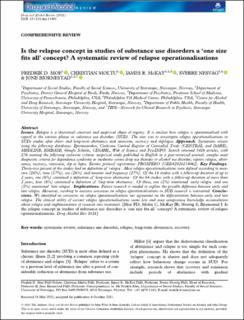| dc.contributor.author | Moe, Fredrik Dreyer | |
| dc.contributor.author | Moltu, Christian | |
| dc.contributor.author | McKay, James R. | |
| dc.contributor.author | Nesvåg, Sverre Martin | |
| dc.contributor.author | Bjørnestad, Jone Ravndal | |
| dc.date.accessioned | 2023-03-10T09:09:32Z | |
| dc.date.available | 2023-03-10T09:09:32Z | |
| dc.date.created | 2021-11-23T08:17:09Z | |
| dc.date.issued | 2021 | |
| dc.identifier.citation | Moe, F. D., Moltu, C., McKay, J. R., Nesvåg, S., & Bjornestad, J. (2022). Is the relapse concept in studies of substance use disorders a ‘one size fits all’concept? A systematic review of relapse operationalisations. Drug and Alcohol Review, 41(4), 743-758. | en_US |
| dc.identifier.issn | 0959-5236 | |
| dc.identifier.uri | https://hdl.handle.net/11250/3057567 | |
| dc.description.abstract | Issues
Relapse is a theoretical construct and empirical object of inquiry. It is unclear how relapse is operationalised with regard to the various phases in substance use disorders (SUD). The aim was to investigate relapse operationalisations in SUDs studies after short- and long-term abstinence and remission, recovery and slip/lapse.
Approach
Systematic review using the following databases: Epistemonikos, Cochrane Central Register of Controlled Trials (CENTRAL and DARE), MEDLINE, EMBASE, Google Scholar, CINAHL, Web of Science and PsycINFO. Search returned 3426 articles, with 276 meeting the following inclusion criteria: empirical study published in English in a peer-reviewed journal; samples meet diagnostic criteria for dependence syndrome or moderate–severe drug use disorder or alcohol use disorder; reports relapse, abstinence, recovery, remission, slip or lapse. Review protocol registration: PROSPERO (CRD42020154062).
Key Findings
Thirty-two percent of the studies had no definition of ‘relapse’. Most relapse operationalisations were defined according to measure (26%), time (17%), use (26%) and amount and frequency (27%). Of the 16 studies with a follow-up duration of up to 2 years, one (6%) contained a definition of ‘long-term abstinence’. Of the 64 studies with a follow-up duration of more than 2 years, four (6%) contained a definition of ‘long-term abstinence’. Of those, one (2%) mentioned ‘early relapse’ and one (2%) mentioned ‘late relapse’.
Implications
Future research is needed to explore the possible difference between early and late relapse. Moreover, working to increase consensus on relapse operationalisations in SUD research is warranted.
Conclusions
We identified no consensus on relapse operationalisations nor agreement on the differentiation between early and late relapse. The clinical utility of current relapse operationalisations seems low and may compromise knowledge accumulation about relapse and implementation of research into treatment. | en_US |
| dc.language.iso | eng | en_US |
| dc.publisher | Wiley | en_US |
| dc.rights | Navngivelse 4.0 Internasjonal | * |
| dc.rights.uri | http://creativecommons.org/licenses/by/4.0/deed.no | * |
| dc.title | Is the relapse concept in studies of substance use disorders a ‘one size fits all’ concept? A systematic review of relapse operationalisations | en_US |
| dc.type | Peer reviewed | en_US |
| dc.type | Journal article | en_US |
| dc.description.version | publishedVersion | en_US |
| dc.rights.holder | The authors | en_US |
| dc.subject.nsi | VDP::Medisinske Fag: 700 | en_US |
| dc.source.pagenumber | 16 | en_US |
| dc.source.journal | Drug and Alcohol Review | en_US |
| dc.identifier.doi | 10.1111/dar.13401 | |
| dc.identifier.cristin | 1957564 | |
| cristin.ispublished | true | |
| cristin.fulltext | original | |
| cristin.qualitycode | 1 | |

